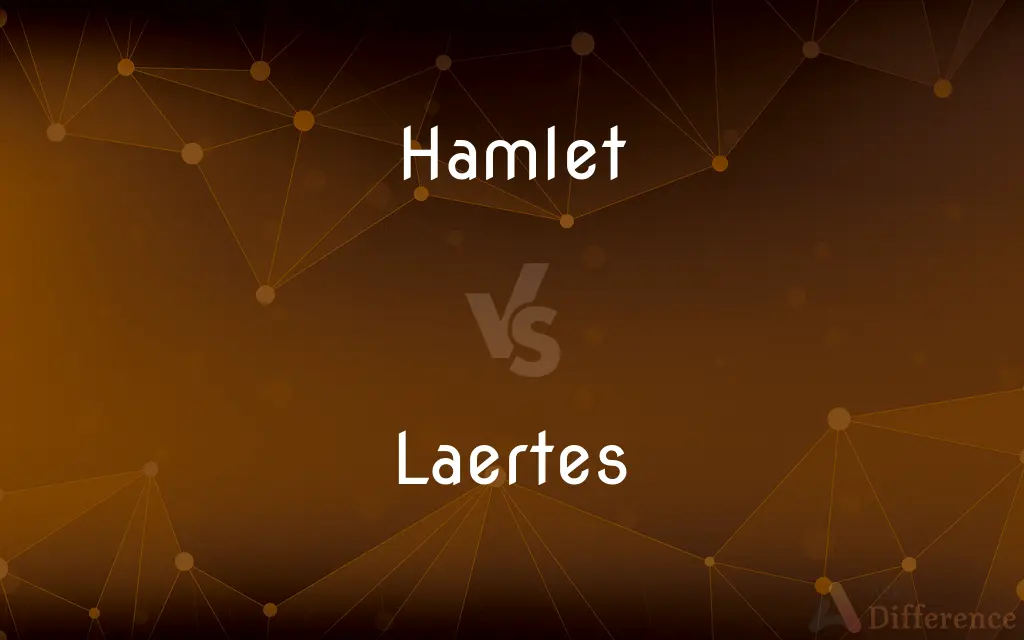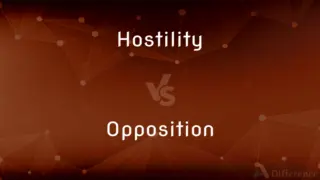Hamlet vs. Laertes — What's the Difference?
By Urooj Arif & Fiza Rafique — Updated on March 20, 2024
Hamlet is the contemplative prince of Denmark, tormented by his father's death and moral dilemmas, whereas Laertes is more straightforward and action-oriented, seeking revenge for his own father's death without hesitation.

Difference Between Hamlet and Laertes
Table of Contents
ADVERTISEMENT
Key Differences
Hamlet, the protagonist of Shakespeare's tragedy, is characterized by his deep philosophical introspection and indecision, particularly regarding avenging his father's murder. His contemplation leads to significant delays in action, reflecting his complex personality and ethical considerations. On the other hand, Laertes, a minor character, is defined by his impulsive and decisive nature. Upon hearing of his father Polonius's death, he immediately seeks vengeance against the perceived perpetrator, showcasing a stark contrast to Hamlet's hesitancy.
Both characters are driven by a desire for revenge; however, their approaches and motivations differ significantly. Hamlet's revenge is complicated by his doubts about the ghost's reliability and the morality of killing Claudius. Laertes, whereas, displays no such hesitation, driven by a straightforward desire for retribution and influenced by Claudius's manipulation, highlighting his susceptibility to external influences compared to Hamlet's introspective struggle.
Hamlet's relationships and interactions are marked by complexity and ambiguity, notably in his dealings with Ophelia, Polonius's daughter, and his mother, Gertrude. His actions are often indirect and layered with meaning, contributing to the tragedy's depth. In contrast, Laertes's interactions are more direct and less nuanced, with his actions driven by clear, uncomplicated motives, reflecting his role as a foil to Hamlet, emphasizing the prince's philosophical depth and indecision.
The outcomes for both characters are tragic, yet their paths to their ends differ. Hamlet's journey is internal and fraught with existential questions, leading to a delayed but ultimately fatal confrontation. Laertes's path is quicker, driven by immediate action, but also ends in his death, a result of his rashness and the machinations of others. This contrast underlines the thematic exploration of action versus inaction, and the complexities of revenge and morality in the play.
In terms of legacy, Hamlet leaves behind a tale of introspection, tragedy, and the burdens of knowledge and moral ambiguity, becoming an iconic figure in literature and philosophy. Laertes, while less prominent, serves as a critical foil to Hamlet, providing a counterpoint that illuminates Hamlet's character and the broader themes of the play, such as the consequences of revenge and the nature of justice.
ADVERTISEMENT
Comparison Chart
Personality
Contemplative, philosophical.
Impulsive, decisive.
Approach to Revenge
Indecisive, moralistic.
Direct, unhesitating.
Influences
Guided by internal conflict.
Easily influenced by others.
Relationships
Complex, ambiguous.
Straightforward, less nuanced.
Outcome
Tragic death after much deliberation.
Quick action leading to tragic death.
Legacy
Symbol of introspection and existential struggle.
Foil to Hamlet, highlighting impulsiveness.
Compare with Definitions
Hamlet
Hamlet is the tragic hero of Shakespeare's play, known for his existential angst.
Hamlet's To be, or not to be soliloquy explores the nature of existence.
Laertes
Laertes's desire for revenge is straightforward and uncomplicated.
He conspires with Claudius to kill Hamlet without hesitation.
Hamlet
Hamlet's relationship with Ophelia is marked by tragedy and misunderstanding.
His erratic behavior contributes to Ophelia's madness and death.
Laertes
Laertes is a foil to Hamlet, characterized by his swift decisions and actions.
He immediately returns to Denmark to avenge Polonius's death.
Hamlet
Hamlet struggles with the task of avenging his father's murder.
He stages a play to confirm Claudius's guilt before taking action.
Laertes
Laertes is more susceptible to external influences than Hamlet.
Claudius easily manipulates him into plotting against Hamlet.
Hamlet
Hamlet's complexity is revealed through his soliloquies.
His speeches provide insight into his internal conflicts and thoughts.
Laertes
Laertes's tragic flaw is his impulsiveness, leading to his downfall.
His rash decision to use a poisoned sword results in his own death.
Hamlet
Hamlet's actions are deeply influenced by his philosophical ponderings.
His contemplation on life and death delays his revenge.
Laertes
Laertes's interactions are marked by directness and a lack of philosophical depth.
His confrontation with Hamlet is straightforward and driven by revenge.
Hamlet
The Tragedy of Hamlet, Prince of Denmark, often shortened to Hamlet (), is a tragedy written by William Shakespeare sometime between 1599 and 1601. It is Shakespeare's longest play, with 29,551 words.
Laertes
In Greek mythology, Laertes (; Greek: Λαέρτης, Laértēs Greek pronunciation: [laː.ér.tɛːs]; also spelled Laërtes) was the father of Odysseus, an Argonaut, and a participant in the hunt for the Calydonian Boar. His title was King of the Cephallenians, an ethnic group who lived both on the Ionian islands and on the mainland, which he presumably inherited from his father Arcesius and grandfather Cephalus.
Hamlet
A small village.
Laertes
The father of Odysseus.
Hamlet
In New York state, an unincorporated community that is within a town and is not a part of a village.
Laertes
(Greek mythology) the father of Odysseus
Hamlet
A small village or a group of houses.
Hamlet
(British) A village that does not have its own church.
Hamlet
Any of the fish of the genus Hypoplectrus in the family Serranidae.
Hamlet
A small village; a little cluster of houses in the country.
The country wasted, and the hamlets burned.
Hamlet
A community of people smaller than a village
Hamlet
The hero of William Shakespeare's tragedy who hoped to avenge the murder of his father
Hamlet
A settlement smaller than a town
Common Curiosities
How do the deaths of Hamlet and Laertes reflect their characters?
Hamlet's death comes after a prolonged internal struggle and contemplation, reflecting his philosophical nature, while Laertes's death is the direct result of his impulsive action, highlighting his rashness.
How does Hamlet's relationship with Ophelia differ from Laertes's relationship with her?
Hamlet's relationship with Ophelia is complex and fraught with misunderstanding, contributing to her madness, while Laertes's relationship with her is that of a protective brother, straightforward and caring.
What role does Claudius play in the actions of Hamlet and Laertes?
Claudius is a manipulative figure who influences Laertes directly by encouraging his desire for revenge, while his actions indirectly cause Hamlet's existential and moral dilemma.
What drives Hamlet's hesitation in seeking revenge?
Hamlet's hesitation is driven by his deep philosophical introspection, doubts about the ghost's reliability, and moral considerations about the act of revenge.
What is the significance of Hamlet and Laertes's duel in the play?
The duel represents the climax of their respective quests for revenge and serves as a dramatic resolution to their intertwined fates, highlighting the tragic consequences of their actions.
How do Hamlet and Laertes represent different responses to grief and injustice?
Hamlet represents a response that is introspective, questioning, and hesitant, while Laertes represents a more immediate, action-oriented response to grief and perceived injustice.
Why does Laertes not hesitate to seek revenge?
Laertes does not hesitate because his motivation is clear and straightforward, driven by the immediate emotional response to his father's death and manipulation by Claudius.
What impact does the societal and familial pressure have on Hamlet and Laertes's decisions?
Both characters are significantly influenced by societal expectations and familial obligations, shaping their responses to their respective tragedies and driving them towards their fates.
In what ways do Hamlet and Laertes's personal philosophies affect their fates?
Hamlet's philosophical and moral contemplations lead to his tragic end through delay and indecision, while Laertes's straightforward philosophy of action propels him towards a swift but equally tragic fate.
Can Laertes be considered a villain in the play?
While Laertes's actions are antagonistic, he is more accurately seen as a tragic figure led by grief and manipulation rather than a true villain.
What does Hamlet admire about Laertes?
Despite their conflict, Hamlet admires Laertes's clear and decisive action, seeing in him a resolve that he finds lacking in himself.
How do Hamlet and Laertes's relationships with their fathers influence their actions?
The reverence and loyalty they feel towards their fathers motivate their quests for revenge, but their approaches are shaped by their individual relationships and perceptions of duty.
What lessons can be learned from the contrast between Hamlet and Laertes's approaches to revenge?
The contrast highlights the complexities of moral and ethical considerations in seeking justice, and the potential consequences of both inaction and rash decisions.
How does Shakespeare use the characters of Hamlet and Laertes to explore the theme of revenge?
Shakespeare uses their contrasting approaches to delve into the nature of revenge, its motivations, and its impact on the individual and those around them, questioning its value and consequences.
Share Your Discovery

Previous Comparison
Hostility vs. Opposition
Next Comparison
Yak vs. MuskoxAuthor Spotlight
Written by
Urooj ArifUrooj is a skilled content writer at Ask Difference, known for her exceptional ability to simplify complex topics into engaging and informative content. With a passion for research and a flair for clear, concise writing, she consistently delivers articles that resonate with our diverse audience.
Co-written by
Fiza RafiqueFiza Rafique is a skilled content writer at AskDifference.com, where she meticulously refines and enhances written pieces. Drawing from her vast editorial expertise, Fiza ensures clarity, accuracy, and precision in every article. Passionate about language, she continually seeks to elevate the quality of content for readers worldwide.















































